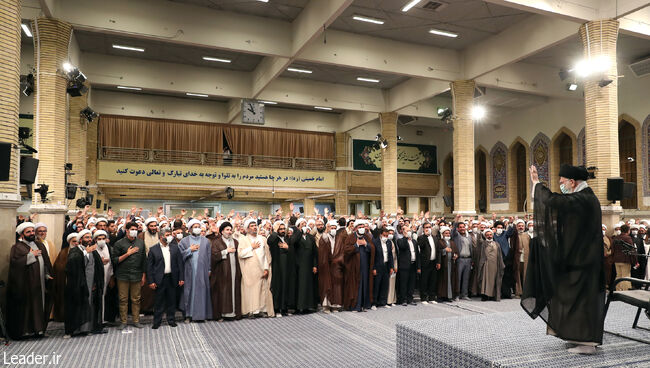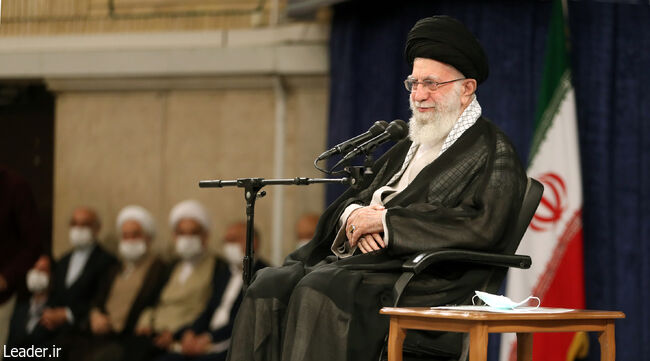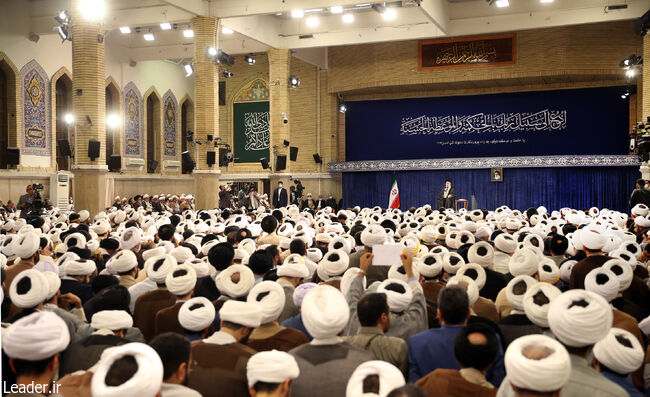This morning, the Supreme Leader of the Islamic Revolution stated in a meeting with religious scholars, seminary students, and Islamic Missiology activists that religion and spiritual goals are the seminaries' essential duty. Referring to practical and up-to-date Missiology tools, he emphasised the importance of understanding the audience and recognising the true nature of global Missiology scenes to have an offensive position and a spirit of jihad. He said, "The younger generation, as the owners and builders of the country's future, should be the centre of attention for creative and innovative Missiology methods and approaches."
During this meeting, which took place close to the start of the month of Muharram, His Eminence Ayatollah Khamenei considered the country's need for research-based Missiology activities to be much greater than the current activities. Citing multiple verses from the Noble Qur'an regarding Misisology and its dimensions and intricacies, they stated, "The religion of Allah cannot be realised amongst the masses except through proper Missiology."
Referring to the importance of the longstanding tradition of Missiology in the Islamic seminaries and the lives of great scholars, they added, "The priority of Missiology among the responsibilities of the seminaries has doubled since the establishment of the Islamic Republic because the establishment of a political system based on religion has increased the hostility of the imperialist powers towards Islam."
The Leader of the Revolution referred to the people's faith as the foundation of the Islamic system and stated, "Preserving the system, in essence, means preserving the faith of the people, which is the most pressing duty. In the current era, Missiology has developed extensively through various methods based on knowledge and the expansion of tools, including the internet and artificial intelligence (a symbol of the post-internet era). Therefore, reason dictates that we consider Missiology our foremost priority in the face of the bloodshed caused by the swords of enemy propaganda."
In addition to the hardware expansion of Western propaganda, His Eminence Ayatollah Khamenei mentioned the advancements in methods of making messages more believable as one of the realities of today. He added, "Using various sciences, including psychology, Westerners present completely false messages as truths in the minds of their audience."
He warned, "If we remain negligent and complacent in the face of new developments in the field of Missiology, we will fall into cultural decline and gradually be afflicted by the abomination of major sins, just like the West. The reparation of such damage is not easily achievable, as the Imam (r.a.) used to say that if Islam is flooded in Iran, its effects will remain for years to come."
After emphasising Missiology's multiplied importance and priority, in the second part of his speech in the meeting with scholars, seminary students, and preachers, the Leader of the Revolution discussed the points and practical tools of Missiology.
His Eminence Ayatollah Khamenei considered understanding the audience as absolutely necessary in any form of Missiology and, referring to the increasing level of awareness among the general population, including youths and young adults, he stated, "Missiology without considering the intellectual level and needs of the audience will be ineffective."
He regarded the decrease in the impact of parents' direct and indirect education on their children as a real problem. He said, "Unfortunately, amidst the chaotic realm of voices on social media and the proliferation of media, the voice conveying traditional and family values has been marginalised."
The Leader of the Revolution considered paying attention to the intellectual and mental composition of the audience as crucial and emphasised the importance of understanding the linguistic context of a community in the Qur'an. He stated, "If the content and method of Missiology do not match the level and needs of the audience, the preacher will not be successful."
The second practical point the His Eminence Ayatollah Khamenei highlighted regarding Missiology was the necessity of avoiding a purely defensive position and the importance of launching an offensive approach against the intellectual foundations of the opposing front.
In order to accomplish this, he emphasised the need to understand what is going on behind the scenes in both virtual and non-virtual media. They stated, "We must be cautious to determine whether Missiological-media-virtual activities are operating independently or if there are hidden agendas behind them, which is the case in many instances."
The Leader of the Revolution identified the opposing front, which labels itself as a liberal democracy, as a deceitful and dishonest front. Referring to numerous realities in contemporary history, he said, "The front against the Iranian nation is opposed to freedom, independent thinking, and any form of democracy that is not subservient to the imperialist powers. The resistance and struggle of the Iranian nation and the Islamic system against this front are a civilisational and global fight."
He regarded the dire situation of Ukraine's helpless and impoverished people as evidence of the enduring motives of colonialism and Western opportunism. He stated, "The people of Ukraine are being sacrificed because the interests of Western arms-manufacturing and -selling corporations are concealed within the ongoing war in Ukraine."
The Leader of the Revolution mentioned that the West is more vulnerable than ever before. He said, "America, which the Imam (r.a.) honoured with the title of 'the Great Satan,' encompasses a collection of Satanic traits and wickedness in various realms such as politics, confrontation with nations, civil confrontation within America, racism, sexual ethics, crimes, and mercilessness."
Concluding this section of the speech, His Eminence Ayatollah Khamenei enumerated the necessity and obligation of engaging in a Missiological defence. However, he stated, "We must not confine ourselves to defence; rather, by obtaining a correct understanding of global realities and seeing them properly, we should utilise the foundations of the enemy's front as fuel for [our] Missiological efforts."
His Eminence Ayatollah Khamenei mentioned a spirit of jihad as the third necessary element for effective Missiology. He stated, "Without a spirit of jihad, errors occur in understanding the situation or Missiological conduct. However, the element of jihad, alongside an intellectual approach and action, guarantees the impact of Missiology."
In an important point, the Leader of the Revolution considered the clergy's presence in the arena absolutely necessary. He said, "The Islamic clergy has always been hopeful, dynamic, and engaged in jihad, standing amid the arena."
He considered focusing on the needs and intellectual nourishment of all segments of society, including intellectuals, writers, thinkers, and artists, as necessary for Missiology. He said, "We must pay special attention to the younger generation because the nation's future belongs to this generation, and their minds should be devoted to building the future without distractions."
The Leader of the Revolution stressed the practical commitment of the youths to religious practices and the avoidance of sins. He highlighted the vital role of mosques and religious gatherings, considering them influential factors.
In the same discussion, His Eminence Ayatollah Khamenei regarded the revival of the mosques as an obligatory matter, and he stated, "Mosques should not only be open during prayer times; rather, they should be a place for constant gathering and interaction."
Referring to one of his previous meetings with people involved in the cinema industry, he said, "Sometimes, we have high expectations from certain people, while we have fallen short in providing the necessary education and intellectual nourishment for them."
The last point that the Leader of the Revolution stressed in this meeting was the need to establish a vast seminarian club (beginning in the Islamic Seminary of Qom and later in other major seminaries) to expand and elevate religious Missiology's quantitative and qualitative aspects.
He mentioned three objectives for this club, "Producing and creating up-to-date and innovative Missiological material, developing advanced and impactful methods of Missiology, and providing effective education and training in its true sense."
At the beginning of the meeting, Hojjat al-Islam wal-Muslimeen A'rafi, the head of Islamic seminaries across the country, stated, "Seminary students and preachers consider themselves duty-bound towards societal issues with ethical conduct, people-centeredness, and the utilisation of knowledge and contemporary tools. They have always been proactive and advocates in fields such as livelihood, social problems, prevention of discrimination, judicial wellbeing, and improving the state of social media."



